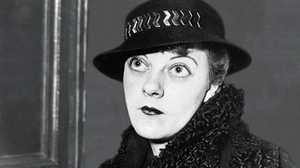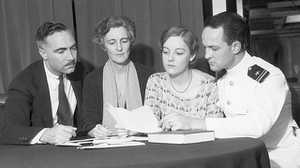Thalia Fortescue Massie (1911-1963)

Named for the Greek muse of comedy, Thalia Fortescue perhaps predictably grew up playing what she saw as harmless pranks. Her privileged social status had always afforded her the freedom to get away with mischief, whether it was driving an idling butcher truck around the block or wheeling a baby in its carriage down the street unbeknownst to its mother.
Elite Status
Thalia's patrician lineage assured her status in the social circles of Washington, D.C. Her mother, Grace Hubbard Fortescue, was the niece of Alexander Graham Bell, and her father, Major Granville "Rolly" Fortescue, was the out-of-wedlock son of Robert Roosevelt, Theodore Roosevelt's uncle.
Childish and Impetuous
As a twenty-year-old Navy wife, Thalia Fortescue never quite embraced adulthood, often acting like a spoiled child. Thalia had not acquired the social graces of her debonair mother or the confidence of her flamboyant father. Instead, her personality appeared in disjointed fragments. Her mother's social grace translated into a keen awareness of class and social distinctions. Of her father's confidence and flamboyance, Thalia only inherited a headstrong impetuosity.
Bored and Headstrong Wife
Thalia's reputation for being snobby and rash did not win her friends in Hawai'i's naval society. While a majority of the Navy wives attended flower arranging and hula classes, Thalia enrolled in classes at the University of Hawai'i to continue her education, which had ended abruptly when she married Lieutenant Thomas H. Massie at the age of 16. The romantic view Thalia had of becoming a Navy wife, a life that had promised adventure and travel, wore off quickly. Despite living in an exotic locale, Thalia found that the numerous social engagements and polite conversations bored her just as easily as had gatherings on the East coast. Used to doing whatever she pleased, Thalia often left parties abruptly, giving other guests the impression that she thought herself socially and intellectually superior. Her attitude had begun to take a toll on her marriage; socializing and entertaining were required to further a Navy career. When Thalia's actions became gossip at the Navy wives' bridge tables, Tommy threatened to send his wife back to her parents if she failed to improve her behavior.
A Fateful Night
Tommy's threat of divorce did not stop Thalia from leaving a Navy party at the Ala Wai Inn alone on Saturday night, September 12, 1931. But something happened on the way home that Thalia knew would have serious repercussions for her marriage. The events, beginning with Thalia's claim, "something terrible has happened," would propel Hawai'i into a state of racial turmoil, command headlines for six months, and end with her husband and mother being convicted of manslaughter.
Broken Marriage
Thalia was briefly accepted as an insider in Navy society. This acceptance kept her marriage together in the short term. However, two years after the murder of Joseph Kahahawai, Tommy's subsequent conviction, and the sentence's commutation, Thalia and Thomas Massie were finally divorced. The night it was finalized, Thalia collapsed in a Reno nightclub following a suicide attempt.
Lost in Lies
Thalia never seemed to be able to control the mental instability she revealed during the 1932 trial of her husband and mother. Her self-serving version of events implicated five men in a crime they could not have committed. One of the men was killed as a result, and the others never fully escaped the shadow of the trial. When investigating Pinkerton detectives reported that the accused young men were undeniably innocent, Thalia rejected their findings, stating, "It's a lie — and a stupid lie." She never exhibited any remorse or discussed the possibility that she had identified the wrong men. Another failed marriage and a number of suicide attempts later, Thalia finally overdosed on barbiturates in her Palm Beach, Florida, home in 1963.







